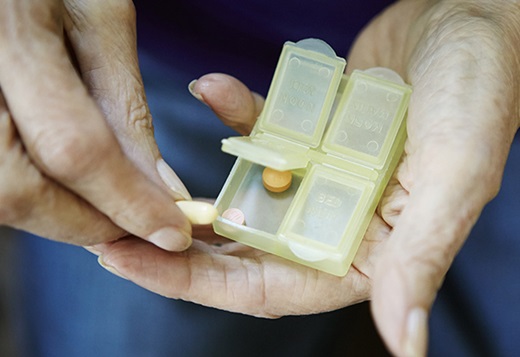Heart Medications: The Power of a Team Approach
If you have heart disease or an elevated risk of it, a variety of conditions or factors—such as high blood pressure and high cholesterol —probably worked together to cause it.

As a result, your doctor will likely recommend that you take multiple heart medications to protect your health and lower your risk of a heart attack. The goal is to treat heart disease from many angles, says Johns Hopkins cardiologist Michael Blaha, M.D., M.P.H.
“You can’t say, ‘I’m on aspirin so I don’t need to be on a statin,’” Blaha says. These are very different drugs that manage different factors contributing to your heart disease.
Here are some common types of heart medications that your doctor may discuss if you’ve had a heart attack or you’re at a high risk of having one.
Aspirin
This inexpensive drug limits your blood’s ability to form clots. If you have heart disease, a substance called plaque has built up in the arteries feeding your heart, causing them to become narrower. A blood clot in one of these arteries could cause a heart attack.
In some cases, for example in people with preexisting heart disease, doctors may choose a different type of anticlotting drug to use in place of aspirin or in combination with it.
Blood pressure medications
Not only do they lower your blood pressure, they also reduce your heart’s workload, Blaha says. If your heart doesn’t have to work as hard, it won’t require as much oxygen-rich blood through the narrowed arteries.
Your doctor can choose from several types of blood pressure medications that work in different ways. These include:
- ACE inhibitors. These medications lower your blood pressure by relaxing your blood vessels.
- Beta-blockers. Using these drugs lowers your heart rate and causes your heart to beat less forcefully.
- Diuretics. These encourage your kidneys to drain more water and salt from your system, which lowers the volume of blood that your heart has to pump through your vessels.
Cholesterol medications
Statins are medications that lower the levels of cholesterol in your bloodstream. This substance is one of the components found in plaque. But experts now think these drugs can also help in other ways, Blaha says. They may make plaques more stable. This means they’re less likely to rupture and cause more damage in the artery. Statins may even reduce the size of plaques.
A new class of medications—called PCSK9 inhibitors—is another cholesterol-lowering option. You may want to learn more about PCSK9 inhibitors, which Blaha says are generating a lot of early excitement among heart doctors.
Medications for related conditions.
If you have diabetes, which is a factor that raises your risk of heart disease, your doctor can prescribe medication to control your blood sugar. If you smoke, you may want to consider taking a prescription medication that can improve your chances of quitting.
Share all of your habits and health history with your doctor, so that he can get a complete picture of your risk and recommend a protection plan tailored to your needs.





